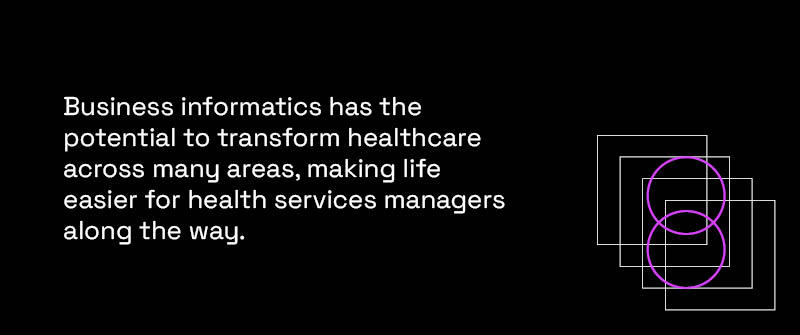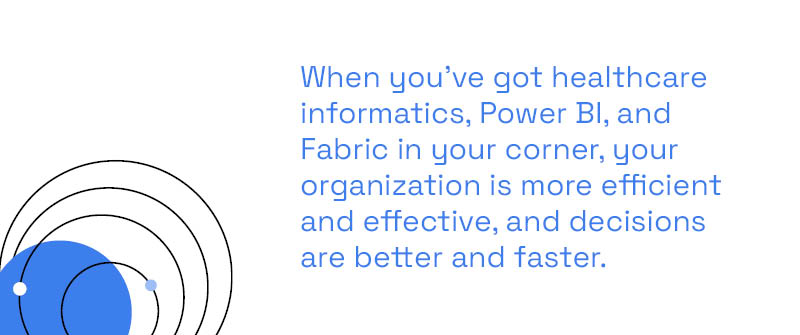
If you’re in healthcare, we know that what drives you is delivering the best patient care. We’re also sure you know that the healthcare industry generates a ton of health care data and patient data. In fact, approximately 30% of the world’s data is generated by the healthcare sector. But all that data won’t lead to better patient outcomes or smoother operations unless you know how to tap into it. That’s where healthcare business informatics comes in.
What is healthcare business informatics? This growing field of health informatics looks at how you collect, store, and use health and medical data from all resources and devices and discovers ways to use it to improve patient care and decision-making. In short, healthcare business informatics helps turn those mountains of data into insights. Here, we’ll dig deeper into healthcare informatics’ role and its impact on healthcare, and how leveraging business intelligence consulting makes all the difference.
With the right tools and expertise, BI consultants and health informatics professionals can help you use healthcare business informatics to improve patient care and align it to your business strategy. Sounds like a win/win.
Unpacking Healthcare Business Informatics
When your healthcare organization runs like a finely tuned engine, your workdays are smoother and much less stressful, right? Healthcare business informatics blends healthcare, data, and technology to make healthcare services more efficient and more effective. It’s all about data management, collecting, and using medical information to streamline processes and improve decision-making, ultimately enhancing patient outcomes. Patients receive better, most cost-effective care, and providers and patients have a smoother experience (and you have fewer headaches).
Healthcare business informatics is typically seen as the intersection of healthcare, computer science, IT, and hardware and software systems. When set up properly by a consultant, it plays a vital role in not only hospitals but in many sectors, including clinicians, healthcare providers, public health experts, insurance, biomedical research, and biotech, who can gain valuable insights and solutions. Informatics’ goals span the industry, from developing new medical technologies, designing public health strategies, to digitizing health information technology records, systems, and processes. A consultant can set you up to seamlessly integrate electronic medical records into existing systems. No need to worry about disrupting your organization. A good consultant will show you how to leverage informatics to improve healthcare delivery and not miss a beat.
The Role and Impact of Informatics in Healthcare
When you can tap into the power of all your healthcare data, and understand that clinical informatics involves turning those raw numbers into actionable insights, your decisions are data-driven, lines of communication are wide open, and you can improve patient outcomes and operational efficiency. Here’s how:
- Reduce Health Data Errors
With systems like Electronic Health Records (EHRs), health informatics specialists ensure health care providers have centralized patient information. Providers have quick and easy access to patient histories, reducing repeated tests or unnecessary procedures. Automated data collecting and analysis means fewer errors in health data entry, prescriptions, diagnostics, and insurance info. All this means more confident, informed care. - Increases Efficiency and Coordination
Streamlining administrative tasks (think scheduling and billing), improving access to information, and enabling more personalized care is a huge win in all healthcare scenarios, from large medical facilities to community clinics, and that’s exactly where organizational informatics shines. Systems like Clinical Decision Support (CDSS) and health info technologies (HIT) enable teams to track patient histories, monitor treatment plans, and improve coordination between providers.
Operational efficiency improves by streamlining workflows for more efficient scheduling, reduced wait times, and optimized resource use. By eliminating waste, you’ll have more cost-effective healthcare delivery.
- Boosts Patient Engagement
Patient portals give patients access to their health records, test results, and appointments. Patients have better communication with providers and more involvement with their care, and social informatics involves research that shows this engagement leads to improved outcomes. - Improves Decision-Making
Clinical decisions around treatment and administrative decisions are supported through real-time data, predictive modeling, and access to treatment data for anyone with similar conditions, a public health informatics focus that ultimately benefits entire communities. - Access to Care for All & Personalized Healthcare
Telehealth and remote monitoring, powered by informatics and informed by biomedical research, bring quality care to rural or underserved areas. Informatics also drives advances in precision medicine used to tailor treatments to patients’ unique needs, including genetics, lifestyle, and medical history. And the ability to analyze massive amounts of data helps identify patterns, predict health risks, and develop targeted plans to improve patient outcomes.
Navigating P3 Adaptive’s Business Informatics Solutions
As you can see, business informatics has the potential to transform healthcare across many areas, making life easier for health services managers along the way. But you may be thinking: ‘That all sounds incredible, but what can business informatics help me do that I can’t do today?’ or ‘How can I use it to enhance my business strategy?’

Here’s where we come in, with an approach that’s flexible, focused, and built around your healthcare business goals. When you partner with our expert consultants, the first step is identifying what’s getting in your way. Some of the most common pain points we hear are disconnected systems, insights that arrive too late, or data that’s technically available but impossible to act on. These challenges can really slow down patient care, operations, and decision-making.
When data is scattered across systems, healthcare teams aren’t getting complete and accurate patient information or a view of the organization as a whole—it’s nearly impossible to get a full picture. That’s why professionals with a health informatics degree are in such high demand. Informatics can play a huge role here. Using business informatics, our team will integrate your systems so that data flows seamlessly across departments and tools. When your data is easily accessible, accurate, and available in real-time, processes are streamlined and teams collaborate more effectively and coordinate better patient care. And most importantly, decisions are data-driven and much faster.
Creating successful data strategies is what we do. We thrive on showing organizations how to make their data work the way it should, by building a data strategy that aligns with your goals and solves your pain points. By connecting your infrastructure, technology, and processes, we’ll help you turn your data into a powerful asset that supports better patient care and smarter operations.
P3 Adaptive’s Portfolio: Informatics Applications and Outcomes
At P3 Adaptive, we know all about how informatics and the right solution make a huge impact in healthcare. And how a solution tailored to your unique needs will make your data work for you (not the other way around). Here’s how we’re different: we don’t roll with a one-size-fits-all solution. We start with the outcome the organization needs, like better care coordination, lower operating costs, or making operations more efficient. Our approach is different from most data partners; we spend the time having deep conversations with business and team leaders to find out what matters most.
Once we know exactly what you need, we’ll deploy healthcare informatics to connect your messy data across EHRs, financial systems, and operations. Next, our top-notch, experienced consultants have the skills in informatics to understand the blend between the technical side of IT and the business side of operations. We’ll design a strategy around that and help define what success looks like for leadership.
Data analytics and business informatics make a powerful team, and we know how to make them click. Business informatics gives you the tools and systems to act on the insights that data analytics provide. With the right data strategy, your strategic goals can become a reality, empowering you with better decision-making and improved patient care. And we’ll be with you every step of the way.
So what about ROI? Here’s another area where P3 Adaptive shines. Our consultants will give you what you need with a much faster time to value. Speed is our superpower; we deliver business outcomes at your pace. And we do it at a price that works for you. We work with an impact-oriented approach, so you’ll start moving forward and seeing ROI faster than you can imagine.
Leveraging Technology: Power BI and Beyond
It’s simple: data drives everything in healthcare. We’ve told you how healthcare informatics helps you create solutions and processes to easily gather all the data from your tools and systems. The next step is where Power BI comes in—it takes all that information and uses it to create data visualizations. A BI consultant can help your team develop interactive reports and dashboards that are easy to consume and deliver powerful analytics to healthcare professionals. Informatics and Power BI make a dynamic team for healthcare professionals.
For instance, doctors can improve patient care by tracking health patterns and the effectiveness of treatment. Hospital administrators can use it to optimize operations, manage resources, and control costs. With clear, up-to-date reporting, it’s easier to keep up with regulatory compliance, too.
Now let’s talk Microsoft Fabric. A Microsoft Fabric consultant can set you up to take advantage of this all-in-one data analytics tool that helps you manage your data in one place. Fabric provides a unified tool for data integration, data engineering, real-time analytics, and business intelligence (no more data silos or jumping between tools). A consultant can help you leverage Microsoft Fabric to solve some of your greatest healthcare challenges. Even better, Power BI is integrated into Fabric to take that data and visualize it, and you’ll have access to AI tools built right in. With the tailored capabilities of Microsoft Fabric for Healthcare, providers can streamline patient data workflows, support real-time analytics, and enhance care coordination across the continuum. When you’ve got healthcare informatics, Power BI, and Fabric in your corner, your organization is more efficient and effective, and decisions are better and faster.
At P3 Adaptive, we have tons of experience with today’s advanced technologies. From Power BI to Microsoft Fabric to Azure and AI, we build data strategies and solutions that are based on your business needs. Our consulting services know exactly how to connect all the best, brightest, and most advanced tech and use it to take your organization to the next level.

Conclusion: Driving Change With P3 Adaptive
Healthcare business informatics is about way more than managing data. It can change the game for healthcare by improving patient care, helping stakeholders, administrators, and providers make better decisions, and enabling operational change. When it’s set up the right way, it can bring strategic value across your entire healthcare ecosystem.
At P3 Adaptive, we help healthcare leaders unlock that value every day—it’s what we do. We partner with you to turn your sea of data into insights with the right tools, solutions, and by working side by side with your team. Wherever you are now and whatever you want to do to move forward, we’ve got you covered. Maybe you’re looking to streamline systems or operations or just start to prepare for what’s next; either way, we’re here to help get you there.
If you’re ready to explore how healthcare business informatics can transform your healthcare strategy, you’re in the right place. Our team will help you to make better decisions with data and get your business ready for a new era in healthcare. Let’s start a conversation.
Get in touch with a P3 team member